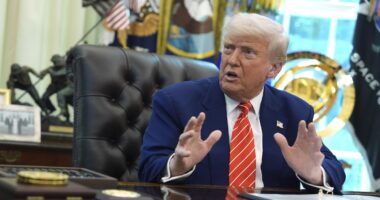
Free speech advocates gathered outside the Supreme Court in Washington, D.C. on March 18, 2024, for the ‘rally to reclaim free speech’ hosted by Children’s Health Defense. The photo of the event was captured by Bryan Olin Dozier/NurPhoto via AP.
TikTok made an emergency plea on Monday to the U.S. Supreme Court to stop a law passed by Congress and endorsed by President Joe Biden. The law would compel TikTok to sever ties with its Chinese parent company or risk a nationwide ban. According to TikTok, this move would result in the closure of one of America’s most popular speech platforms just before a presidential inauguration.
In a filing dated December 16, TikTok’s legal team stated, “This, in turn, will silence the speech of Applicants and the many Americans who use the platform to communicate about politics, commerce, arts, and other matters of public concern.” They urged the Court to issue an injunction until a further review could be conducted.
The social media app, which is owned by the Chinese company ByteDance, called on the country’s highest court to act by Jan. 6 or watch as the public suffers “immediate” and “irreparable” injury as a result of the law in question — known as the Protecting Americans from Foreign Adversary Controlled Applications Act — just 10 days after the U.S. Court of Appeals for the District of Columbia Circuit upheld the law.
“We recognize that this decision has significant implications for TikTok and its users,” the appeals court wrote in its ruling.
“Unless TikTok executes a qualified divestiture by January 19, 2025 — or the President grants a 90-day extension based upon progress towards a qualified divestiture — its platform will effectively be unavailable in the United States, at least for a time,” the appeals court explained. “Consequently, TikTok’s millions of users will need to find alternative media of communication. That burden is attributable to the PRC’s hybrid commercial threat to U.S. national security, not to the U.S. Government, which engaged with TikTok through a multi-year process in an effort to find an alternative solution.”
It’s estimated that over 170 million Americans use TikTok, which has been accused of “covert Chinese content manipulation” and having lax data security, according to the app’s lawyers, who have labeled the law’s alleged protections from such accusations as “gross overbreadth.”
“The strong combined inference is that Congress passed the Act for a different reason entirely,” the TikTok filing says. “It targeted TikTok based on disagreement with the substance of the content posted by TikTok’s users and alleged editorial choices by TikTok Inc. in disseminating that content. A House committee report and statements by individual Members all confirm as much. Yet Congress has no legitimate interest in interfering with the U.S. ownership of an expressive platform to alter its content — whether or not Congress deems some such content foreign propaganda. This Court has already made that clear, and it is likely to reaffirm that fundamental principle here.”
The Protecting Americans from Foreign Adversary Controlled Applications Act was passed in April as a measure by Congress and then signed into law by Biden that same month. It was given a Jan. 19 divest-or-ban deadline.
“The Supreme Court has an established record of upholding Americans’ right to free speech,” TikTok said in a statement Monday. “Today, TikTok is asking the Court to do what it has traditionally done in free speech cases: apply the most rigorous scrutiny to speech bans and conclude that it violates the First Amendment.”
If the Supreme Court does nothing and the ban goes through, TikTok claims it will lead to “massive and unprecedented censorship” of Americans. The company “estimates” small businesses would lose more than $1 billion in revenue and creators would “suffer almost $300 million in lost earnings in just one month” unless the ban is halted.
If the Supreme Court does step in, the justices will then be tasked with deciding whether the TikTok law is constitutionally sound in a ruling that could come months from now.
President-elect Donald Trump told reporters on Monday that he plans to “take a look at TikTok” once in office, though it’s unclear what that means exactly. “You know, I have a warm spot in my heart for TikTok,” Trump said, according to The Hill. “I won youth by 34 points, and there are those that say that TikTok had something to do with it.”












